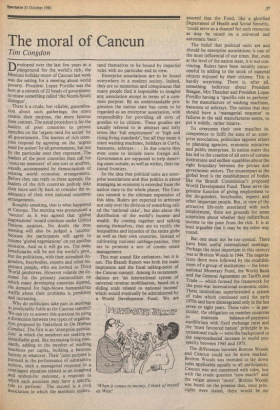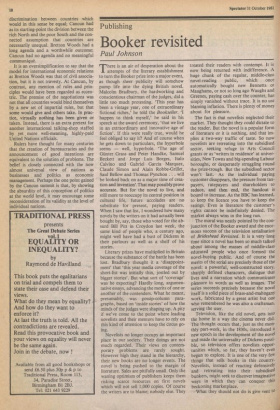The moral of Cancun
Tim Congdon
Developed over the last few years as a playground for the world's rich, the Mexican holiday resort of Cancun last week was the setting for a meeting about world Poverty. President Lopez Portillo was the host at a summit of 22 heads of government to renew something called 'the North-South dialogue'.
. There is a crude, but reliable, generalisation about such gatherings: the more cosmic their purpose, the more fatuous their content. The usual procedure is for the leaders of poor countries to present speeches on the 'urgent need for action' by all governments. The leaders of rich countries respond by agreeing on the 'urgent need for action' by all governments, but not by the particular ones they represent. The leaders of the poor countries then call for 'concrete measures' of one sort or another, usually accompanied by denunciations of existing world economic arrangements. Before they can reply to these appeals, the leaders of the rich countries politely take their leave and fly back to consider the inadequacy of their own national economic arrangements.
Roughly speaking, that is what happened at Cancun. The meeting was pronounced a success' as it was agreed that 'global • negotiations' would continue under United Nations auspices. No doubt the next meeting will also be judged a 'success' because the participants will agree to resume 'global negotiations' on yet another occasion. And so it will go on. The main beneficiaries will be not the world's poor, but the politicians, with their attendant dogooders, busybodies, experts and other imPortant people, who are invited to Third World jamborees. However volatile the demand for the primary commodities on Which many developing countries depend, the demand for high-blown humanitarian waffle about their problems is persistent and increasing. Why do politicians take part in meetings as predictably futile as the Cancun summit? We can try to answer this question by using a. distinction between two types of organisation proposed by Oakeshott in On Human Conduct. The first is an 'enterprise association' in which the members are seeking an identifiable goal, like increasing living standards, adding to the number of washing machines per capita, building a bassoon factory or whatever. Their 'joint purpose is Pursued in the performance of substantive actions, each a managerial response to a contingent situation related to an imagined and wished-for outcome, a response. in Which each associate may have a specific role to perform'. The second is a civil association in which the members unders tand themselves to be bound by impartial rules with no particular end in view.
Enterprise associations are to be found everywhere in a modern society. Indeed, they are so numerous and conspicuous that many people find it impossible to imagine any association except in terms of a common purpose. By an understandable progression the nation state has come to be regarded as an enterprise association, with responsibility for providing all sorts of goodies to its citizens. These goodies are usually referred to in abstract and lofty terms like 'full employment' or 'high and rising living standards', but all they mean is more washing machines, holidays in Corfu, bassoons, ashtrays . . . In due course they even come to include more foreign aid. Governments are supposed to help deserving cases outside, as well as within, their national frontiers.
So the idea that political units are enterprise associations and that politics is about managing an economy is extended from the nation state to the whole planet. The Cancun summit is the ultimate expression of this idea. Rulers are expected to arbitrate not only over the division of something called the 'national cake', but also about the distribution of the world's income and wealth. By coming together and talking among themselves, they are to rectify the inequalities and injustice of the entire globe as well as their own countries. Instead of cultivating national cabbage-patches, they are to promote a sort of cosmic estate management. This may sound like caricature, but it is not. The Brandt Report was both the main inspiration and the focal talking-point of the Canctui summit. Among its recommendations are 'an international system of universal revenue mobilisation, based on a sliding scale related to national income' which would eventually be administered by a World Development Fund. We are assured that the Fund, like a glorified Department of Health and Social Security, 'could serve as a channel for such resources as may be raised on a universal and automatic basis'.
The belief that political units are and should be enterprise associations is one of the most influential of our times. But, even at the level of the nation state, it is not convincing. Rulers have been notably unsuccessful in adding to the stock of material objects enjoyed by their citizens. This is hardly surprising. There is, after all, something ludicrous about •President Reagan, Mrs Thatcher and President Lopez Portillo having a 'specific role to perform' in the manufacture of washing machines, bassoons or ashtrays. The notion that they should have a 'managerial response' to failures in the said manufactures seems, to put it mildly, rather bizarre.
To overcome their own manifest incompetence to fulfil the aims of an enterprise association, politicians appoint others to planning agencies, economic ministries and public enterprises. In nation states this has led to the creation of all sorts of curious institutions and endless squabbles about the right boundary between the private and government sectors. The counterpart at the global level is the establishment of bodies like the Brandt Commission's proposed World Development Fund. These serve the genuine function of giving employment to the do-gooders, busybodies, experts and other important people. But, in view of the attractive life-style associated with such employment, there are grounds for some scepticism about whether they redistribute income to the poor from the rich. It is at least arguable that it may be the other way round.
But one must not be too cynical. There have been useful international meetings. Perhaps the most important in this century was at Bretton Woods in 1944. The negotiations there were followed by the establishment of a group of institutions — the International Monetary Fund, the World Bank and the General Agreement on Tariffs and Trade — which formed the framework for the post-war international economic order. These institutions superintended a system of rules which continued until the early 1970s and have disintegrated only in the last seven or eight years. These rules — in particular, the obligation on member countries to maintain equilibrium with fixedbeaxiacnhcaen-goef-rpaatems balance-of-payments the 'most favoured nation' principle in international trade — were the background to the unprecedented increase in world prosperity between 1945 and 1973.
The differences between Bretton Woods and Cancun could not be more marked. Bretton Woods was intended to lay down rules applicable equally to all participants; Cancun was not concerned with rules, but with the crude question 'how much?' and the vulgar answer 'more'. Bretton Woods was based on the premise that, once principles were stated, there would be no discrimination between countries which would in this sense be equal; Cancun had as its starting-point the division between the rich North and the poor South and the connected assumption that countries are necessarily unequal. Bretton Woods had a long agenda and a worthwhile outcome; Cancun had no agenda and no meaningful communique.
It is an oversimplification to say that the model for international economic relations at Bretton Woods was that of civil association, but it is not travesty. At Cancun, by contrast, any mention of rules and principles would have been regarded as eccentric. The premise of the negotiations was not that all countries would bind themselves by a new set of impartial rules, but that some would give and others take. In practice, virtually nothing has been given or taken. Instead, there is an extra pretext for another international talking-shop staffed by yet more well-meaning, highly-paid United Nations officials.
Rulers have thought for many centuries that the creation of bureaucracies and the announcement of good intentions are equivalent to the solution of problems. The belief is closely connected with the now almost universal view of nations as businesses and politics as economic management. Perhaps the one point gained by the Cancun summit is that, by showing the absurdity of this conception of politics at the world level, it may encourage some reconsideration of its validity at the level of individual nations.







































 Previous page
Previous page